Analysis
Nigerian Man, Kingsley Ogbuji, Promoted To Major In US Army
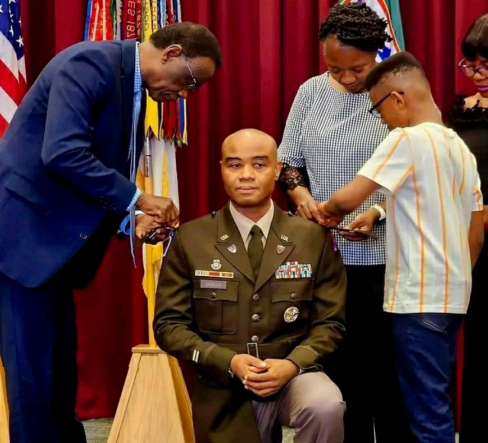
Kingsley Ogbuji, a Nigerian man from Ebonyi State, has been promoted to the rank of Major in the US Army. The promotion ceremony was presided over by Lieutenant General Bagle, who congratulated Ogbuji on his achievement.
Ogbuji expressed his gratitude on social media, stating, “To God be the glory, I am amazed.” He also holds a Master of Arts degree in Administrative Leadership from the University of Oklahoma. As a Major in the US Army, Ogbuji has demonstrated exceptional leadership and dedication to his duties.
His promotion is a testament to his hard work and commitment to serving his country. In addition to his military career, Ogbuji also serves as a volunteer for UNICEF USA, showcasing his passion for making a positive impact in his community and beyond.
The promotion of Kingsley Ogbuji to Major in the US Army is a remarkable achievement that highlights the potential of Nigerian individuals to excel in various fields globally
Analysis
Time to Defend Every Nigerian Life, by Boniface Ihiasota
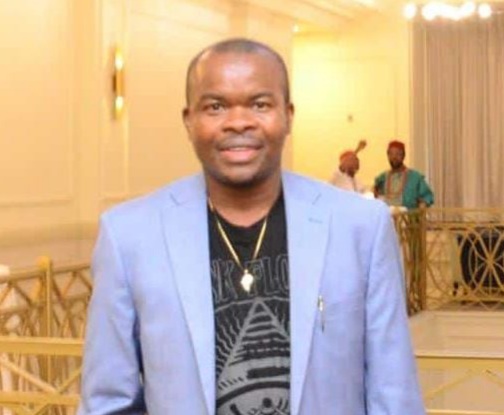
Time to Defend Every Nigerian Life, by Boniface Ihiasota
Nigeria stands today at a moral and historical crossroads, one that demands clear-eyed reflection and courageous action. From the vantage point of the diaspora, with the benefit of distance yet the burden of deep emotional connection, it is impossible to ignore the painful realities unfolding across parts of the Middle Belt and the North. Communities that once lived in harmony now grapple with waves of violence often described with soft, almost technical language — “herder-farmer clashes,” “bandit attacks,” “reprisal killings.”
Behind these labels are fathers and mothers who can no longer return to their farms, children who sleep in fear, elders watching the erosion of traditions that once bound communities together, and families who have endured losses no words can fully capture. These are Nigerians — Christians, Muslims, farmers, herders, artisans, all deserving of dignity and safety.
This crisis is not simply a security failure. It is a moral test of our nationhood. In the diaspora, we encounter societies where public safety, community trust, and national cohesion are not abstract aspirations; they are supported by deliberate, well-funded systems. These systems are not perfect, but they offer models Nigeria can adapt in practical, culturally grounded ways.
And while the statistics on Nigeria’s challenges are sobering, they point not to government guilt, but to the urgent need for coordinated, transparent, data-driven reforms that protect vulnerable communities and rebuild public confidence.
Reports cited by global faith-monitoring organisations, humanitarian groups, and rights bodies present a troubling picture. One frequently referenced dataset in international discourse, including the 2024 World Watch List, places Nigeria among countries where Christians face severe risks, with figures running into the thousands for those reported killed in 2023 alone.
Parliamentary briefings abroad and humanitarian groups such as the Humanitarian Aid Relief Trust have documented recurring attacks, widespread displacement, and systematic destruction of villages. Other organisations, such as Intersociety, also chronicle patterns of violence affecting both Christians and Muslims in rural regions. While some of these figures remain contested within Nigeria, they nevertheless reinforce the urgency of strengthening national protection systems and ensuring that every Nigerian, irrespective of faith or ethnicity, is afforded equal security, equal justice, and equal empathy.
From a diaspora viewpoint, what stands out is not just the scale of the violence but the preventable nature of many tragedies. Advanced countries facing communal tensions have invested in strong early-warning networks, multi-agency coordination mechanisms, and community-centred policing models.
These systems show measurable success by improving response times, reducing escalation, and fostering trust between citizens and security institutions. Nigeria can draw practical lessons from these approaches. Effective national coordination models, such as those used in the United States for crisis management, rely on unified command structures, common communication standards, and the integration of faith-based and community organisations into emergency planning.
A Nigerian adaptation of this model could create a national platform where security agencies, traditional rulers, faith leaders, and civil society jointly analyse threats, share intelligence, and mobilise rapid responses. Such a structure, rooted in Nigeria’s cultural realities but informed by global best practices, would save lives.
Equally important is community policing, not the informal, unregulated kind that fuels abuse or vigilantism, but structured, accountable, measurable partnership policing. Countries like the UK and Canada demonstrate that when local security actors operate with clear legal boundaries, training, and oversight, citizen trust and intelligence flow improve dramatically. Nigeria can replicate this by formally integrating vetted community groups and traditional institutions into local security frameworks under police supervision. This approach respects the local knowledge that rural communities possess while ensuring professional accountability.
Security, however, is only one dimension. The human cost of the violence like displacement, destroyed livelihoods, psychological trauma requires a level of social investment that advanced nations routinely prioritise.
International health bodies highlight that conflict exposure significantly heightens long-term mental health needs. Nigeria will require expanded trauma care, community counselling programs, and accessible psychosocial support delivered through primary healthcare and faith networks. Rebuilding homes, restoring farms, and providing tools and training are equally essential; these interventions not only restore dignity but also deepen trust in government.
Places of worship, too often targeted, need structured protection. Advanced countries have implemented national schemes that support security upgrades for mosques, churches, synagogues, and temples most at risk. Nigeria can create a similar framework in high-risk regions, providing basic infrastructure like lighting, reinforced entry points, and community safety training. Such measures demonstrate state commitment to protecting freedom of worship, a constitutional right and a moral obligation.
As the diaspora, we recognise the efforts the Nigerian government has already made in confronting insurgency and upgrading security architecture. But the next phase requires deliberate attention to vulnerable rural populations in flashpoint areas like Plateau, Benue, and Southern Kaduna. These regions are not peripheral; they are central to Nigeria’s food security, interfaith cohesion, and national stability. Protecting them is both a justice imperative and a strategic necessity.
The path forward must be one of collaboration, not division. Churches and mosques must champion narratives of unity. Civil society must monitor data transparently. Media must avoid sensationalism and focus on verified information. Security agencies must be commended when they act swiftly and fairly, and held accountable when they fall short. Government must demonstrate openness, empathy, and partnership. And the diaspora must continue to contribute technical expertise, advocacy, and resources.
Nigeria has survived darker moments and emerged stronger. With decisive leadership, evidence-based reforms, and a renewed commitment to the sanctity of every Nigerian life, this tragedy can be transformed into an opportunity for national rebirth. The time for blame is over. What Nigeria needs now is compassion anchored in facts, courage backed by action, and collaboration driven by a shared belief that every Nigerian deserves to live and worship without fear.
Analysis
As G20 Moves On Without America, by Alabidun Shuaib AbdulRahman

As G20 Moves On Without America, by Alabidun Shuaib AbdulRahman
When the G20 summit convened this November in Johannesburg, the first time the gathering has ever been held on African soil, one seat was starkly empty. The world’s largest economy, the Donald J. Trump-led United States, simply refused to attend. No president, no senior envoy, not even a delegation. The absence was louder than any diplomatic communiqué, a void that hung over the proceedings like an unspoken challenge.
For weeks before the summit, Trump had telegraphed the boycott. He announced that no U.S. official would participate, calling it “a total disgrace” that the gathering was being hosted in South Africa. He justified the walkout with allegations that Pretoria was enabling abuses against its white-minority Afrikaner community and presiding over land seizures and a supposed “white genocide”—claims widely rejected within South Africa and dismissed by many global observers. Still, he held to his stance, ensuring that the United States would be missing from the table it once dominated.
Yet the empty chair did not halt the summit. Far from it. When the doors closed and the work began, more than forty countries and organisations had confirmed their participation. According to South Africa’s foreign-affairs minister, a total of forty-two delegations were registered: twenty G20 member states (excluding the U.S.), sixteen invited guest nations, and six representing regional economic blocs across Africa, the Caribbean and East Asia. It was one of the most diverse gatherings in the forum’s history.
Of the twenty G20 member states, a clear majority sent their heads of state or government. Four countries opted for high-level substitutes: Russia, Mexico and Argentina sent their foreign ministers or equivalents, while China was represented by its Premier rather than President Xi Jinping. Apart from these deviations and the complete American boycott, the turnout remained strong. At least sixteen G20 countries had their top leadership present, a level consistent with or even above several previous summits.
The question, then, is what this moment signifies—for the G20, for Africa’s place in global governance, and for a world increasingly shaped by fractured geopolitics.
The symbolic dimension is impossible to ignore. For decades the United States has been the gravitational centre of global economic coordination, the anchor whose participation guaranteed that G20 pronouncements could be translated into global action. Without Washington in the room, many of the traditional levers of influence like financial stability mechanisms, trade dynamics, institutional power felt looser and less predictable. The absence introduced doubt: could the G20 still claim to be the premier platform for steering the global economy if its most powerful member stayed away? Some analysts wondered whether the forum’s future was in jeopardy.
Yet paradoxically, the boycott created breathing space. Instead of collapsing under the weight of American non-participation, the summit moved forward with surprising cohesion. Leaders adopted a 122-point declaration issued unusually on the summit’s opening day that centred on climate action, debt sustainability, energy transition and global inequality. These were not peripheral concerns but core priorities, particularly for developing economies. And critically, they reflected Africa’s agenda far more directly than in past years.
For Africa, a continent long relegated to the fringes of global decision-making, the Johannesburg summit brought a subtle but significant shift. It marked a moment where issues that have shaped African suffering and aspiration, unsustainable debt, climate vulnerability, access to green energy, development finance were not treated as charity cases or footnotes but as global imperatives. South Africa’s leadership in shaping the agenda was evident: it shepherded conversations that placed the continent not as a crisis zone but as a partner with agency.
Even the ending of the summit carried symbolism. The traditional handover of the G20 presidency, typically marked by the passing of a wooden gavel from one host to the next, did not unfold in its usual choreography. President Cyril Ramaphosa brought the meeting to a close with a strike of the gavel, but there was no American official to step forward and receive the ceremonial baton. The moment underscored the deeper reality: the world’s most powerful nation had chosen absence in a year when Africa chose presence.
Naturally, this raised concerns. If powerful states begin treating multilateral forums as optional, depending on domestic politics or ideological sentiments, the foundations of global governance weaken. The G20 has played central roles in navigating financial crises, stabilising commodity markets, coordinating pandemic responses and mobilizing climate finance. A precedent where a superpower boycotts the summit could encourage similar behaviour by others in future moments of crisis. The potential ripple effects on global trust, crisis management and economic coordination are worrying.
But Johannesburg also demonstrated that the G20 is more adaptable than its critics assume. Instead of paralysis, the summit produced consensus. Instead of division, it surfaced shared interests. And instead of waiting for the United States to validate decisions, countries across continents showed that cooperation was still possible, even necessary, without America’s guiding hand.
For many African nations, this sense of possibility was palpable. For years, they have been the subjects of global policies drafted in distant capitals. In Johannesburg, they felt more like contributors. The declaration reflected structural concerns that matter from Lagos to Nairobi: access to concessional finance, green industrialization, fair energy transition pathways, investment in resilience rather than repeated cycles of vulnerability. These were not afterthoughts but central pillars.
Still, optimism should remain grounded. Declarations alone do not build roads, transition energy grids or relieve debt burdens. They do not shift the voting power held by wealthy nations in global financial institutions. And they do not erase the influence the United States wields over the IMF, World Bank and other structures that control the flow of global capital. Even in absence, Washington’s shadow is long.
At the same time, the boycott raises uncomfortable questions about the future. If summits can be walked away from because of domestic political narratives or ideological disagreements, the global architecture becomes more fragile. Future crises, whether debt shocks, pandemics, food shortages or climate-induced disasters require collaboration and not boycotts. A forum that can be abandoned sets troubling precedents.
Yet this moment may also become a hinge in history. Not because it solves everything, but because it marks a shift in rhythm. It shows the system bending, under pressure, toward greater inclusion. It proves that Africa can host, convene and even lead. More than nineteen members signed the declaration; voices from the Global South resonated with unusual clarity. And for once, those who are often asked to wait for the powerful to decide had already begun making decisions of their own.
For Nigeria, the implications are profound. The global conversation is moving toward issues that directly affect its development path: debt restructuring, climate resilience, green industrial transformation, food security and transparent governance. Nigeria must engage with these shifts deliberately. Declarations will mean little if national policy fails to align with them. The country needs bold investments in climate adaptation, expanded support for agriculture and manufacturing, improved fiscal management and stronger accountability mechanisms. Its diaspora and civil society have roles to play as watchdogs, advocates and bridges linking global promises to local action.
The United States will remain central in global affairs. Its currency, markets and institutional power ensure that. But the Johannesburg summit demonstrated something important: relevance in the G20 is no longer solely measured by presence. Sometimes absence reshapes the conversation more than participation. The empty chair at Johannesburg was not just a diplomatic symbol; it became a catalyst for rethinking old assumptions.
The challenge now is to ensure that the space created by that absence is not wasted. The real measure of success will lie in implementation in whether climate justice initiatives become real funding pipelines, whether debt deals become fairer, whether green energy investments materialise, and whether global decisions begin to reflect the needs of people from Kenya to Ghana, rather than only those in United States or Germany. It will lie in whether African leaders rise to the occasion, using the moment to insist on equity rather than settling for symbolism.
The world watched as the G20 pressed on, limping perhaps, but moving. And Africa did more than host; it spoke, it influenced, it guided. If Nigeria and the rest of the continent seize the momentum, the reverberation of that gavel strike in Johannesburg could echo not only through global institutions but through local communities seeking fairness and development.
In the end, the empty seat left behind by the United States did not define the summit. The G20 may not have needed America to agree on a declaration in 2025. But building a future that transcends absence will require a different kind of presence.
If Africa answers that call, history may yet record that the empty chair marked not a failure, but the beginning of something new.
Alabidun is a media practitioner and can be reached via alabidungoldenson@gmail.com
Analysis
The Cost of Diplomatic Absence, by Boniface Ihiasota

The Cost of Diplomatic Absence, by Boniface Ihiasota
There are moments when international events force nations to rethink long-standing practices. The recent warning issued by the United States President Donald Trump—his threat to “completely wipe out the Islamic terrorists” in Nigeria has had such an effect. It cast an uncomfortable spotlight on Nigeria’s diplomatic posture and prompted a renewed effort by President Bola Ahmed Tinubu to revisit the long-delayed process of appointing envoys to Nigeria’s missions abroad.
Since September 2023, when the Federal Government recalled ambassadors from 76 embassies, 22 high commissions, and 11 consulates for a reassessment of foreign policy, these missions have remained without substantive leadership. What began as a routine institutional review evolved into an extended period of silence, one that has raised concern among observers of Nigeria’s global engagement. Prolonged diplomatic absence, especially from key international capitals, is not merely a bureaucratic inconvenience; it has consequences for national reputation, security, and strategic influence.
Diplomacy, in its essence, is the outward expression of national purpose. It operates not only through grand speeches or high-level summits but also through the daily, often quiet, presence of envoys who interpret national interests to the world. In this sense, ambassadors are more than titular heads of missions. They embody a nation’s voice, reflect its priorities, and help maintain its visibility on the global stage. Their work is unglamorous but indispensable.
When a country leaves its diplomatic missions without ambassadors, it risks conveying the wrong message. In international relations, absence is not neutral; it is interpreted. It can suggest indecision, internal disarray, or a diminished sense of global responsibility. More importantly, it creates a vacuum in which other actors both state and non-state alike shape narratives and perspectives that later become difficult to reverse.
Nigeria’s empty seats in global diplomatic spaces have come at a moment when the country needs the opposite posture. With increasing global scrutiny over security conditions, economic performance, and governance, Nigeria requires a strong and articulate presence in world capitals. Without ambassadors, opportunities to shape discussions, build trust, and negotiate mutually beneficial partnerships are significantly reduced.
Foreign perception matters. It influences investor confidence, determines the strength of international coalitions, and frames global understanding of domestic challenges. Where perception is left unmanaged, misinformation thrives. Where representation is weak, adversarial interpretations gain traction. The absence of ambassadors thus weakens Nigeria’s ability to shape outcomes that directly affect its security and prosperity.
This context makes the delay in deploying ambassadors particularly costly. Whatever justification may have guided the temporary withdrawal of envoys, the prolonged pause has become counterproductive. Diplomacy is not a field that tolerates long silences. Nations communicate constantly, if not through official channels, then through alternative interpretations, assumptions, and second-hand narratives.
The renewed urgency to appoint envoys is therefore not only timely but necessary. Diplomacy is a critical pillar of national security. While the armed forces confront threats at home, ambassadors work to secure understanding, cooperation, and support abroad. No envoy can stop terrorism in Nigeria, but a well-positioned ambassador can correct harmful mischaracterisations, build alliances that improve intelligence-sharing, and advocate for policies that align with Nigeria’s interests.
In the absence of such representation, other voices dominate. And in global diplomacy, the most powerful argument often belongs to the most present actor.
The recent tension triggered by Trump’s comments demonstrates the risk of leaving Nigeria’s international presence thin. The challenge is not solely the comment itself but the possibility that it gains momentum in diplomatic circles without Nigeria’s strongest counter-narrative in place. Embassies without ambassadors lack the authoritative leadership required to engage effectively with policymakers during such moments.
Diplomatic presence is not symbolic; it is strategic. Nations that understand this invest heavily in their foreign missions. They appoint capable, knowledgeable envoys who understand both the domestic context they represent and the global environment they operate in. They ensure that ambassadors are not merely figureheads but active participants in shaping international views.
Nigeria must embrace this approach. The global environment is shifting rapidly—economically, politically, and technologically. Countries that fail to adapt are left behind. This is not the time for Nigeria to be absent from critical diplomatic engagements. It is a time to reaffirm its place, articulate its priorities, and demonstrate its relevance.
Ultimately, diplomacy is about purpose. A nation must know what it stands for and deploy its resources accordingly. Leaving missions indefinitely without ambassadors sends the wrong signal, not only to the international community but also to Nigerians at home and abroad who expect a proactive foreign policy.
If Nigeria seeks stronger partnerships, improved security cooperation, increased investment, and a more accurate global understanding of its challenges and aspirations, it must begin with one foundational step: ensuring that its diplomatic seats are not left empty.
A nation that does not speak cannot be heard. And a nation that does not show up cannot shape its future.
-
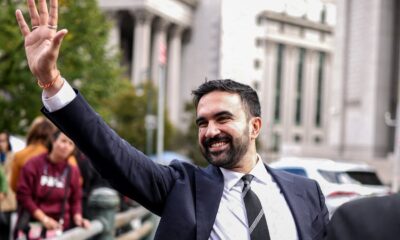
 News1 week ago
News1 week agoTrump, Mamdani Strike Conciliatory Tone After ‘Productive’ White House Meeting
-
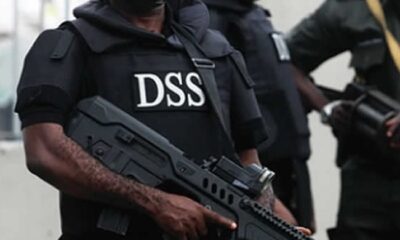
 News1 week ago
News1 week agoKwara Church Attack: Police, DSS Arrest Suspected Bandits’ Armourer, Logistics Suppliers
-
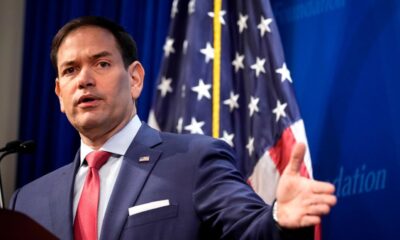
 News1 week ago
News1 week ago‘Tremendous Progress’ in Ukraine Peace Talks as Trump Slams Kyiv Over ‘Ungratefulness’
-

 News3 days ago
News3 days agoInsecurity: US Spy Plane Begins Operations in Nigeria
-

 News1 week ago
News1 week agoNigeria Reels as 315 Pupils Abducted in Niger, 50 Escape
-
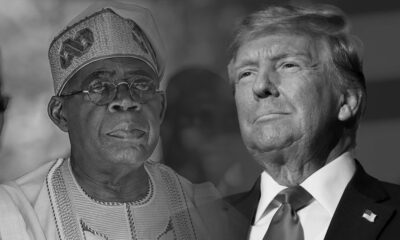
 News1 week ago
News1 week ago‘Genocide in Nigeria!’ Trump Roars, Threatens Action












